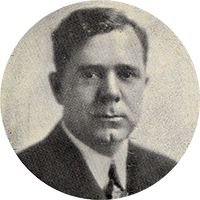Huey Long grew up on a farm in the poorest part of Louisiana. He came from a large, comfortable family in the small, close-knit community of Winnfield. It was the perfect combination to foster self-confidence and compassion in a precocious boy. His home was a haven of security, faith, and education, which provided him with all the fundamentals to succeed. Meanwhile he was sadly aware that many of his poor friends and neighbors had no opportunity at all.
His brilliant mind and boundless energy caused Huey to hopscotch through life, skipping every other step. With a modicum of formal education, a dab of experience, and a sense of urgency, Huey charged into politics on a mission to help the poor. He began by cutting train fares and utility rates in his first public office and rapidly developed a state-wide reputation as a champion of the common man.
Over the formidable opposition of the entrenched political oligarchy, an unfriendly press, and the Ku Klux Klan, Huey rose to the governorship on the shoulders of Louisiana's masses in 1928. Opposed each step of the way by the powerful elite, he transformed the physical and political landscape of Louisiana, providing roads, bridges, free school books, public education, healthcare, and equal access to the voting booth for all.
Halfway through his term as governor the Great Depression swept the entire nation. Believing that his “Share Our Wealth” program was the cure for the country's ailing economy, Long quickly won a United States Senate seat to take his plan to all of America's poor. When both the Democratic and Republican parties refused his program, Long positioned himself as a third-party challenger in the 1936 presidential election.
Huey Long was caught in a race against time that he could not win. Unable to stop him by legal means, his enemies resorted to violence. Threats, assassination plots, and physical attacks against himself and his family beleaguered him.
On September 8, 1935, Huey Long was shot in the corridors of the Louisiana State Capitol that he built. He died two days later. More than 200,000 grateful mourners flocked to Baton Rouge to pay their respects at the massive public viewing at the Capitol. He is buried on the Capitol grounds, where a statue depicts his remarkable achievements.
















